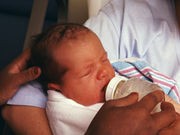

When babies are born, the birth process covers their bodies with countless microbes that play crucial roles in their future health. But a new study suggests that these “microbiomes” are altered by cesarean births, antibiotics and formula feeding.
“The microbiome is really important in how a baby develops normally. We are doing things that are disrupting them,” said Dr. Martin Blaser, director of the Human Microbiome Program at New York University Langone Medical Center.
What do these microbiomes do?
Microbiomes evolved with humans and are mostly helpful, explained Annie Gatewood Hoen. She’s an assistant professor of epidemiology and biomedical data science at the Geisel School of Medicine at Dartmouth, in New Hampshire.
“These organisms help digest our food, train our immune system and out-compete disease-causing microbes,” she said.
But, there’s still a lot of mystery about how they work.
“They’re very complex and everyone’s is slightly different,” Hoen said, and it’s not entirely clear what healthy ones should look like.
“There is a lot left to discover about how subtle variations in the makeup of these communities might be more or less optimal for health and, importantly, how we can manipulate them so they’re most beneficial to us,” she added.
The new study examined the microbiomes of newborns after they left the sterile environment of the womb.
Blaser and his colleagues used stool samples to track the intestinal germ makeup of 43 U.S. infants during the first two years of life. The researchers also analyzed the microbiomes of their mothers.
The investigators found that antibiotic use, cesarean birth and formula feeding all threw off the makeup of the microbiomes from levels considered normal. In essence, their make-up became less diverse, Blaser said.
“We didn’t measure health effects, so we can’t say whether that’s good or bad,” he added.
However, previous research has linked C-sections and antibiotics to higher rates of digestive illness, obesity and asthma, Blaser noted. And doctors recommend breast-feeding over the use of formula for similar reasons.
A second study followed 39 Finnish infants to the age of 3 years, and found that antibiotics were linked to less-diverse microbiomes in the children.
The study, led by Moran Yassour, a postdoctoral fellow at the Broad Institute and Harvard Medical School in Boston, also found a temporary rise in the number of antibiotic resistance genes when antibiotics were given.
What should parents of newborns do? Blaser said antibiotics are important medicines but they shouldn’t be overused.
“We’ve known for a long time that we’re overtreating kids with antibiotics, and we’re beginning to find evidence that it will hurt them,” he said.
Dr. Alexander Khoruts, a professor of medicine at the University of Minnesota, agreed. “Antibiotics early in life may well have serious consequences that may not manifest for years,” he said.
“Both the microbiome and the baby go through developmental stages, and there is a lot of cross-talk between the microbes and the host,” he added. “A disrupted conversation due to antibiotics can lead to hardwiring of the immune system, for example.”
This, he said, can lead to allergies and other conditions linked to overactive immune systems.
As for cesarean births, study co-author Blaser said they should only be performed if medically necessary. He also recommends breast milk over formula.
What’s next for research? In the future, it may be possible to counteract things that disrupt the microbiome, Blaser said. For now, “we’re continuing to follow these children.”
The studies were published June 15 in the journal Science Translational Medicine.
More information
The University of Utah has more about changing microbiomes.
Source: HealthDay
Copyright © 2024 HealthDay. All rights reserved.

Leave a Reply